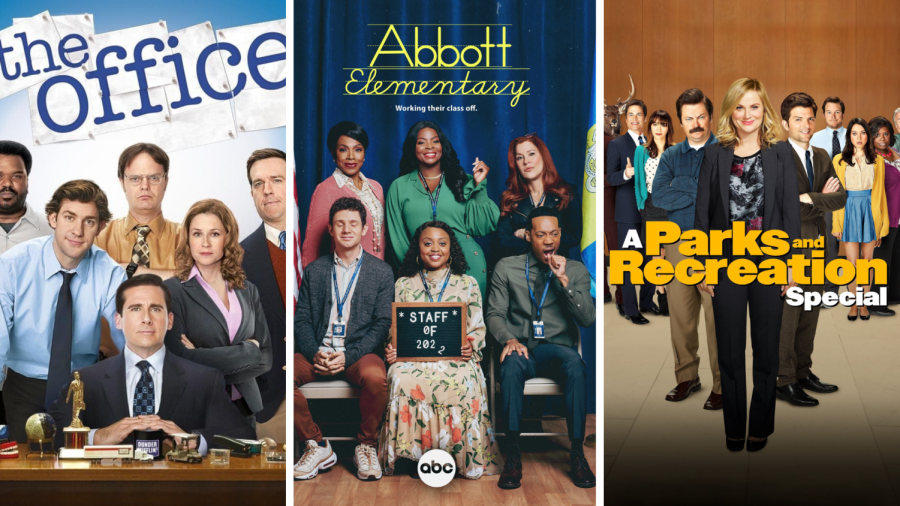Is a resurgence of “mockumentaries” soon to arrive?
Used under fair use from Warner Bros., Universal Media Studios and Deedle-Dee Productions.
Mockumentaries have been a long-standing staple of TV comedy shows.
February 6, 2023
Characterized by humor as dry as the Sahara, an amalgam of ironic characters, and many awkward cameraman interviews, mockumentaries are a celebrated staple of television. Primarily gaining popularity in the 2000s and early 2010s with the release of media such as “The Office,” “Parks and Recreation” and “Borat,” the recent show “Abbot Elementary” has rekindled a flame in the hearts of mockumentary fans.
The term “mockumentary” originated from Rob Reiner, director of the hit TV show “This is Spinal Tap” in an interview to define its style that danced between comedy and seriousness, cringe and amusement, and script and improvisation. Yet even before cable TV became widely available, mockumentary-style media has been entertaining Americans. Most famously, Orson Welles’ 1938 “War of the Worlds” radio broadcast declared a supposed alien invasion that would lead to genocide. Despite including a warning prior to the skit that the described events were false, it sent America into a widespread hysteria. This inspired a series of similar “jokes” played on the public, including BBC Network’s 1957 airing of an April Fool’s Day prank, convincing a gullible and riveted audience that spaghetti was harvested off of trees. More than anything, this seems to indicate television’s acute ability to make us doubt ourselves with proper delivery. A refreshing break from Jim Carrey’s overdramatized expressions or exaggerated transatlantic accents in other forms of media, the mockumentary genre has translated humor into a stare into the camera and monotone speaking.
As mockumentary movies and shows gained momentum, the release of “Borat: Cultural Learnings of America for Make Benefit Glorious Nation of Kazakhstan” garnered praise and revolutionized a newer style of humor. Notably, it incorporated what makes the mockumentary style so discernable in present-day: awkward yet personable characters and an air of discomfort. The main character, Borat, is himself a practical joke, but the fact that the film doesn’t openly recognize this with an obnoxious laughing track or over-the-top comedy acts makes it all the more sweeter. Masking hilarity with seriousness, shows such as “The Office,” “Trailer Park Vandals” and “Parks and Recreation” gained international accolades.
Airing its pilot episode in December 2021, mockumentary sitcom series “Abbott Elementary” has basked in the revival of this comedy style. It follows elementary school teachers as they navigate the struggles of budget cuts, whiny kids and hectoring parents. Similar to acclaimed mockumentary “The Office” and its star, Michael Scott, “Abbott Elementary” centers around an irritating protagonist, Jeanine, who takes it upon herself to spur widespread and often unwanted school improvements. While these characters often intentionally get on viewers’ nerves, they provide conflict and opportunity for humor. The show has won multiple Emmy awards in 2022, including “Outstanding Casting for a Comedy Series,” a deserved title since a successful mockumentary hinges on its cast and the actors’ improvisation styles. Furthermore, the Television Critics Association has awarded it with “Program of the Year” and “Outstanding New Program” and the 2023 Global Globes has recognized it as the “Best Television Series,” among other achievements.
Mockumentaries long-standing prevalence in pop culture and recent resurgence alludes to its everlasting impact and provides high hopes that it will remain an integral aspect of television.




























































